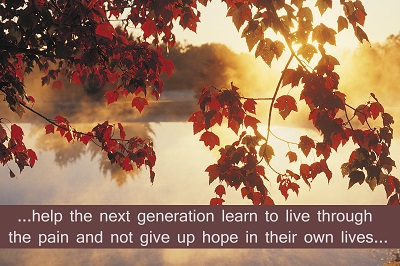05 Jun 2013
What Does A Sober Life Look Like?
“When we first came into A.A., a sober life seemed strange. We wondered what life could possibly be like without ever taking a drink. At first, a sober life seemed unnatural. But the longer we’re in A.A., the more natural this way of life seems. And now we know that the life we’re living in A.A., the sobriety, the fellowship, the faith in God, and the trying to help each other, is the most natural way we could possibly live.” (Twenty-Four Hours A Day, January 14)
When practicing addicts hear the word “sober” they immediately think of an eternity of boredom, drudgery, suffering, loneliness, anxiety, or just plain blah. As we stand at the edge of the diving board, trying to decide if we really want to dive into this program, we can’t help thinking of all of the fun nights we won’t be having, the awkward explanations for why we aren’t drinking, the new un-fun persona we imagine we’ll have to assume, and all the friends who will eventually stop calling. This is the reward for giving up booze?
For a while there is no way around it—we’re going to feel a little like fish out of water. Whether we like to admit it or not, we have built our lives around our behaviors and substances of choice. The prospect of a day or night without our fix made us uneasy, apprehensive, and anxious—provoking a feeling of dread. Unwilling to walk through the space of time without our drug of choice, we abandoned our plan to make a go of it sober and headed back to the welcoming arms of our old friend and nemesis.
But there came a day when there was no choice. We couldn’t keep up the drinking game any longer. If we were going to actually live and avoid certain alcoholic death, we were going to have to muster the courage to try sobriety.
But then something interesting happens. What we thought would be drudgery turns out to be delight. This has been true for many people and it can be true for you too.

In sobriety, life becomes something to live—an event for which to be present—not a doom from which we need to escape. Suddenly we find that we enjoy our days without alcohol and that we are seeing and experiencing the world in a new way. It is not boring—it is exhilarating.
New pleasures are discovered. When we drank we only thought of the euphoric rush of getting our fix and escaping even the smallest of irritations and anxieties. But in sobriety we learn how to meet life and how to embrace it—even in the challenges. We notice beauty, we learn new skills, we give our time to new activities, we feel ourselves growing stronger and developing as people. Life is full and rich and soon we don’t even miss alcohol.
Loneliness slips away in favor of real relationships. Though we often drank in the presence of others, our real date was with the booze. It was with alcohol that we felt we could be ourselves—whomever that was. We struggled to form real relationships of mutual trust and love with other people. We feared vulnerability. But in recovery we are learning how to give and take, how to be a friend, how to serve, and how to love. Our life is filling up with people who care about us and we are seeing the joys of authentic relationships—joys which alcohol could never provide.
Sobriety comes first. We never thought we’d say that sobriety and the program were our number one priorities, but we are learning that the new life we are becoming accustomed to, and even beginning to cherish, is utterly dependent upon it. We don’t handle these blessings carelessly. We know we are always just one sip away from where we were, and now we can’t bear the thought of going back.
“I realized that I had to separate my sobriety from everything else that was going on in my life. No matter what happened or didn’t happen, I couldn’t drink. In fact, none of these things that I was going through had anything to do with my sobriety; the tides of life flow endlessly for better or worse, both good and bad, and I cannot allow my sobriety to become dependent on these ups and downs of living. Sobriety must have a life of its own.” (Alcoholics Anonymous, He Only Lived To Drink, 451)
Want to get your Sober Life with the 12 Step Program? Think it’s just for Christians? Read: Recovery Myth-Buster: A.A. Is A Christian Organization
When people are afraid to get on an airplane, friends may comfort them by saying that many more people die in motor vehicle accidents than in airplane crashes. It seems incomprehensible to think that someone could say, “And even more people die by suicide.” But according to the Centers for Disease Control and Prevention (CDC), that is, in fact, the case.
In a recent issue of the CDCs Morbidity and Mortality Weekly Report, the number of people who died in motor vehicle accidents in 2010 was listed at 33,687, while the number of people who committed suicide was 38,364. Researchers noted that the majority of Americans taking their own lives were in the baby boomer generation. Economic problems, easier accessibility to opioids and stresses caused by care-giving are just some of the suspected causes of the suicide increase in this generation.
Suicide rates climbed most alarmingly in the baby boomer generation. In the 10-year study period, women in their 60s had a 60 percent increase in suicides (eight per 100,000) while men in their 50s had a 50 percent increase (27 per 100,000).

Researchers speculate on multiple reasons for the spike in the suicide rate. Baby boomers are arriving at reflective ages where some of them are not satisfied with where they are in their life. Life’s pressures and problems seem to prove too much for some.
Multiple problems and pressures may be pushing the American suicide rate higher. Financial loss or strain is just one possible reason for a feeling of hopelessness that may lead to suicide. Researchers believe that other problems may be caused by the overuse and easy accessibility of prescription painkillers. Opioid addiction is also rising in this country.
Being a caregiver for an aging parent while also taking care of a child who has returned home after college can also take a toll on boomer parents. While that age group is supporting family both older and younger than themselves, who is supporting them?
CDC representatives stress that the suicide rate may decline if more prevention programs and support is offered to those at risk for suicide. Sometimes it is not just one of the above mentioned problems or pressures—it is a combination. These complex reasons can be better sorted out with the guidance of professionals
Not only should at-risk individuals be helped, but so should those who have lost a loved one to suicide. Support groups to help those survivors can help the next generation learn to live through the pain and not give up hope in their own lives.
Read More About Opioid Abuse And Suicide Risks
03 Jun 2013
Is the Entertainment Industry to Blame for Drug and Alcohol Problems of Former Child Stars?
If you are like me, you have probably wondered why so many former child television, movie, and music stars have ended up addicted to drugs and alcohol, and just in general are living lives marked by excessive levels of melodrama and notoriety.
From Judy Garland in Hollywood’s Golden Age to contemporary figures such as Michael Jackson, Macaulay Culkin, Britney Spears, and Lindsay Lohan, there are innumerable case histories of individuals who found success on the stage, screen, and in the recording studio at tender ages only to be plagued by bouts with substance abuse and mental and emotional breakdown as they advanced into adulthood. Given how frequent and awful the stories of tragedy have been, it would be difficult not to draw the conclusion that there is something inherently traumatic about great success in the entertainment industry that causes talented young people who make it to the big time to eventually lose their way.
This is indeed an easy conclusion to draw, but that does not make it the correct one. There is no question that what young people who reach stardom at early ages experience is something far removed from normal or routine, and it may very well be that so much public scrutiny and attention so early in life does have an impact on impressionable minds that is not altogether positive. But for the sake of balance and perspective, it must be acknowledged that there have been scores of people who found success in the entertainment business who grow up to be happy, normal, successful and extremely well-adjusted people.
 So for example, while Judy Garland’s experiences with substance abuse have received much attention over the decades, we would be remiss if we did not note that the life of her contemporary, (and the most famous child star the world has ever seen), Shirley Temple, went in an entirely different direction. Temple eventually left the motion picture business and entered the world of international politics, where she helped blaze trails for women everywhere by securing appointments as a U.N. representative and the U.S. ambassador to Ghana and Czechoslovakia. And what is one to make of the career of Ron Howard, who began working steadily as an actor at the age of 6 and went on to become one of the most successful directors in the business and by all accounts a completely sober and level-headed guy? And what about all the formerly young stars who rose to prominence right alongside the notorious guys and gals we have all grown to know so well (Lindsay, Britney, Charlie Sheen, etc.) whose names have never once appeared in the tabloid press because they were busted for a DUI or forced to enter a rehab center?
So for example, while Judy Garland’s experiences with substance abuse have received much attention over the decades, we would be remiss if we did not note that the life of her contemporary, (and the most famous child star the world has ever seen), Shirley Temple, went in an entirely different direction. Temple eventually left the motion picture business and entered the world of international politics, where she helped blaze trails for women everywhere by securing appointments as a U.N. representative and the U.S. ambassador to Ghana and Czechoslovakia. And what is one to make of the career of Ron Howard, who began working steadily as an actor at the age of 6 and went on to become one of the most successful directors in the business and by all accounts a completely sober and level-headed guy? And what about all the formerly young stars who rose to prominence right alongside the notorious guys and gals we have all grown to know so well (Lindsay, Britney, Charlie Sheen, etc.) whose names have never once appeared in the tabloid press because they were busted for a DUI or forced to enter a rehab center?
There are countless examples of former child television, movie, or music stars who have gone on to lead admirable and entirely sane lives. And even among those who have run into trouble, there are many like Drew Barrymore who have been able to bounce back and apparently recover from their substance abuse issues. If we were to take a comprehensive survey, we would most likely discover that these stories of normalcy and triumph outnumber the scandalous tales and stunted life histories of Hollywood’s irredeemable bad boys and girls by a significant margin, but of course people aren’t really interested in hearing about all of the child stars who didn’t end up dead, addicted, or on the skids as adults.
This is not to suggest that there is no problem here. Insiders agree that the drug culture is alive and well in both Hollywood and the music industry and that levels of drug abuse and alcohol consumption are higher among celebrities than among the general public. But just because a certain type of temptation exists does not mean that all who are exposed to it will succumb even if they have been involved with those cultures from an early age, and the fact that so many don’t would tend to suggest that when grown child stars end up addicted and corrupted, there is a lot more going on than meets the eye.
When Parents Don’t Parent, Kids Don’t Grow Up
Rather than blaming the entertainment industry, we need to take a much closer look at the parents of these lost souls, who chose to expose their kids to the public eye during a potentially fragile stage of their lives. Many of the stars who have had the most trouble were actually pushed into the industry by moms and dads who were in it for the money or who wanted to bask in the glory of having famous sons or daughters. Judy Garland, Lindsay Lohan, Gary Coleman, Tatum O’Neal and Michael Jackson are just a few examples of troubled former child stars whose parents seem to have been more interested in fame and fortune than they were in the welfare of their children. In fact, it is quite rare to find former child stars who became addicted to drugs or alcohol later in life who would testify that they came from safe, secure and loving homes. On the other hand, young entertainers who grew up in stable homes with parents who always watched out for their interests and never pushed them to do anything they weren’t ready for are the ones who, for the most part, have seemed to do just fine after reaching maturity.
And that is the key word – maturity. So many of the child stars who have struggled as adults (Michael Jackson is the most obvious example here) never really grew up. Because their lives were so abnormal and distorted, they were never able to make the transition from adolescence to adulthood, and this “failure to launch,” to use a colloquial term, is what left them vulnerable to the dangerous temptations that the entertainment culture offers so readily. Immaturity and insecurity go hand-in-hand, which explains why Hollywood and the music industry attract so many people who lust after fame and fortune because they believe that getting people to pay attention to them and notice them is the one and only thing that can fill up the empty spaces in their souls. And what makes the situation so difficult for many former child stars is that they were taught to think and feel this way from an early age by parents who were projecting their own immaturity onto their helpless offspring.
Lights, Camera, Destruction!
 Behind the glitz, glamour, and money, Hollywood and the music industry share a dark side, and intensive involvement in this world may not be good for the minds, bodies, and spirits of vulnerable people who are in no position emotionally or psychologically to avoid all the potential pitfalls. The former child stars whose moms and dads pushed them toward the bright lights instead of allowing them to find their own passions undoubtedly carry many scars, and the bouts with substance abuse that so many have experienced is a direct reflection of this parental neglect and abandonment (lets call it what it is, kids forced to live out their parents’ dreams were most assuredly neglected and abandoned).
Behind the glitz, glamour, and money, Hollywood and the music industry share a dark side, and intensive involvement in this world may not be good for the minds, bodies, and spirits of vulnerable people who are in no position emotionally or psychologically to avoid all the potential pitfalls. The former child stars whose moms and dads pushed them toward the bright lights instead of allowing them to find their own passions undoubtedly carry many scars, and the bouts with substance abuse that so many have experienced is a direct reflection of this parental neglect and abandonment (lets call it what it is, kids forced to live out their parents’ dreams were most assuredly neglected and abandoned).
Celebrity itself is not to blame for the problem behavior of famous people, but the fact that so many seek fame with such hunger and desperation, as if it were the only thing that mattered, is a sign of deep-seated psychological and emotional immaturity. Child stars all too often are the victims of such misguided ambitions, rooted in the subconscious of their caregivers, and this is why it is hardly surprising that so many eventually fall into the greedy, grasping clutches of drugs and alcohol. Fame and fortune cannot replace parental love and support, and those who attain the former without the latter are almost inevitably headed for disaster—and the cameras will be right there to capture every moment of the action once it finally arrives.
More Hollywood News about Addiction: Colin Farrell: On Overcoming Addiction To Booze And Drugs


